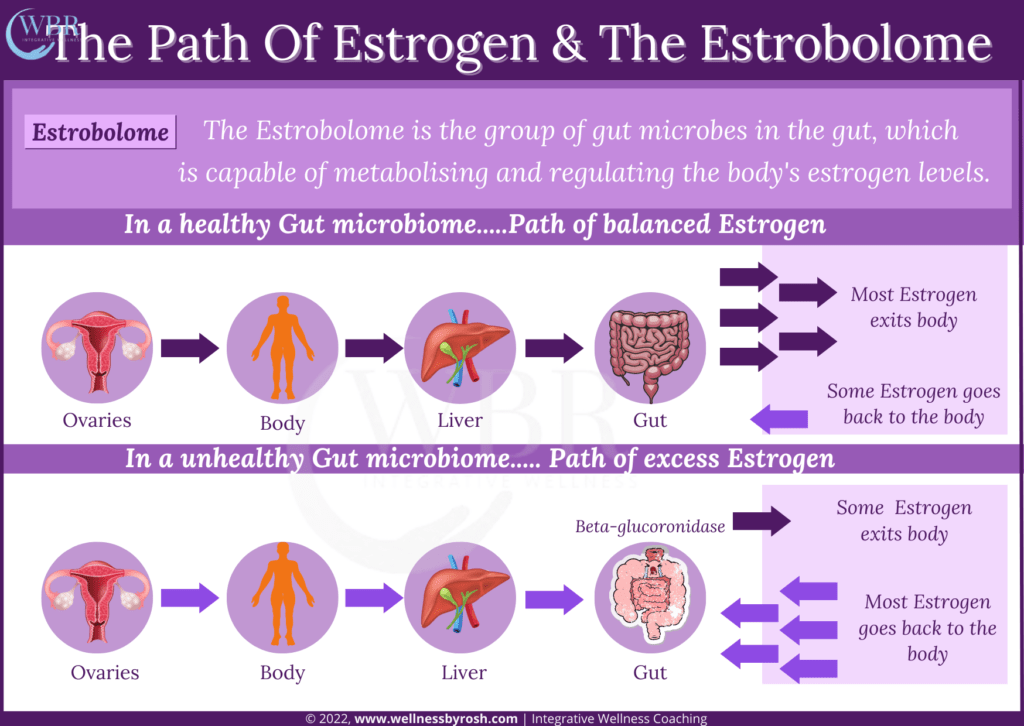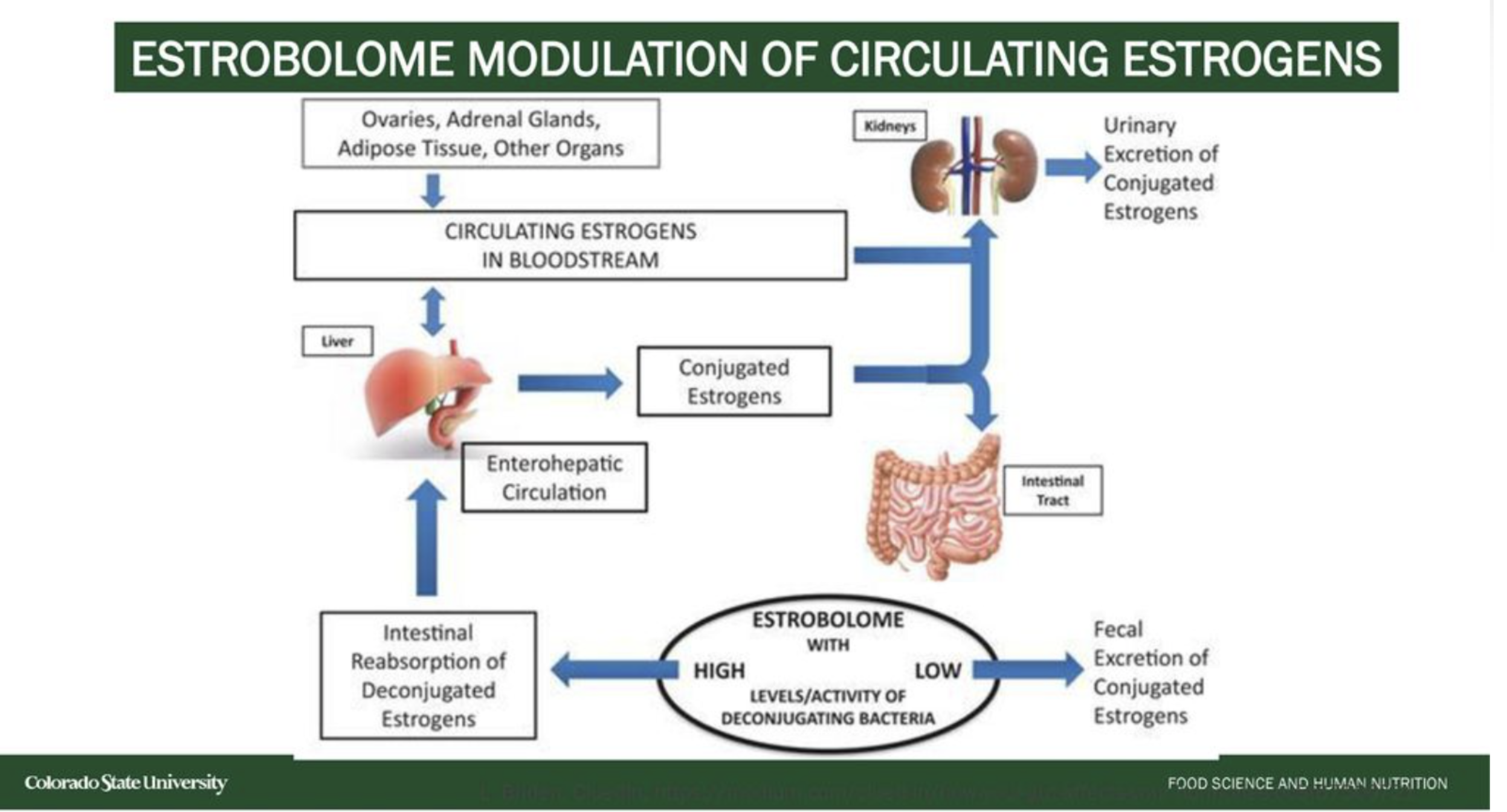The Estrobolome: Your Gut's Role In Hormonal Balance & Health
Could the key to hormonal balance lie within the depths of your gut? The estrobolome, a complex ecosystem of bacteria within the gut microbiome, is now recognized as a critical player in regulating estrogen levels, and understanding its function may hold the key to managing a range of health concerns.
Estradiol, a primary form of estrogen, is essential for orchestrating female development, influencing everything from secondary sexual characteristics, like the development of breasts and a feminine fat distribution, to the maintenance of reproductive tissues, bone health, heart function, and cognitive processes like memory. Its influence extends far beyond the reproductive system, impacting overall well-being.
The estrobolome is a collection of bacteria in the gut that is capable of metabolizing and modulating the bodys circulating estrogen. A healthy estrobolome minimizes reabsorption of estrogen from the gut, allowing safe removal as waste in stool and urine, ensuring hormone balance. Conversely, disruption of this delicate balance can lead to imbalances in estrogen levels, contributing to a range of health problems.
The human microbiome, a vast community of trillions of microorganisms residing primarily in the gut, plays a crucial role in numerous physiological processes, and its impact on estrogen metabolism is becoming increasingly evident. This intricate ecosystem influences not only digestion and nutrient absorption but also hormone regulation, immunity, and even mental health.
The "estrobolome 7 second reset" suggests a targeted approach to restoring balance to the gut microbiome and optimizing estrogen metabolism. This approach focuses on eliminating foods and lifestyle factors that negatively impact the estrobolome while incorporating practices that promote its health.
Here's a brief overview of the estrobolome and its impact on health:
| Aspect | Details |
|---|---|
| Definition | The portion of the gut microbiome that influences estrogen metabolism. It is a group of microbes that can influence the estrogen balance in your body. |
| Function | Metabolizes and modulates circulating estrogen, regulating estrogen levels, and supporting its excretion. |
| Impact | Plays a vital role in hormone balance, influencing various aspects of health and well-being. |
| Factors Influencing Composition | Antibiotics, drugs, diet, lifestyle practices that disrupt the microbiome (like hormonal contraceptives and antibiotics), stress, and other factors. |
| Role in Menopause | Understanding the estrobolomes role in menopause provides a critical basis for developing strategies to enhance gut health, which can lead to more effective management of menopausal symptoms. |
| Connection to Endometriosis | The estrobolome (along with the genitourinary microbiome) is an area of interest in endometriosis as well. Studies have shown a correlation between GI and urogenital bacterial species and concentrations of urinary estrogen and metabolites. |
The composition of the estrobolome, much like the overall gut microbiome, is shaped by a variety of factors. These include dietary choices, exposure to antibiotics and other medications, and even lifestyle habits like stress management. As research evolves, it is becoming increasingly clear that our daily choices have a profound impact on this internal ecosystem and, consequently, on hormone balance. Specifically, hormonal contraceptives and antibiotics can disrupt the gut microbiome, thereby altering estrogen levels, leading to negative impacts on the estrobolome. Moreover, emerging studies highlight how diet and lifestyle practices that disrupt the microbiome can also adversely affect the estrobolome, contributing to estrogen imbalances and related health problems.
The liver metabolizes estrogen, conjugating it and delivering it to the bile for excretion into the gut. A healthy estrobolome then minimizes the reabsorption of this estrogen, allowing for its safe removal through stool and urine, ultimately ensuring hormone balance.
Gut dysbiosis, an imbalance of gut bacteria, can significantly affect the estrobolome. When the microbiome is disrupted, the estrobolome's ability to properly metabolize and regulate estrogen can be compromised. This disruption can lead to an accumulation of estrogen or, conversely, a deficiency, resulting in various health implications. Maintaining a balanced and healthy gut microbiome is therefore crucial for supporting the estrobolome and promoting overall hormonal health.
Various factors can influence the function of the estrobolome and, consequently, estrogen levels. Diet, medications such as antibiotics and hormonal contraceptives, and stress can all play a role in disrupting the delicate balance of the gut microbiome. The food you eat and the lifestyle choices you make, therefore, have a direct impact on your hormone balance and overall health. Some factors affecting the estrobolome are: diet, drugs, antibiotics, stress and hormonal contraceptive and many more.
Understanding the link between the estrobolome and estrogen metabolism is especially relevant in the context of menopause. As estrogen levels naturally decline during this phase of life, the ability of the estrobolome to modulate and maintain hormonal balance becomes even more critical. Supporting gut health and optimizing estrobolome function can potentially alleviate menopausal symptoms and improve overall well-being during this transition. For women with pathologically confirmed endometriosis, studies have shown a strong correlation between GI and urogenital bacterial species and concentrations of urinary estrogen and metabolites, indicating a connection between the two.
The concept of the estrobolome, first defined in 2011, underscores the intricate interplay between the gut microbiome and hormonal regulation. The estrobolome is the portion of the microbiome that influences estrogen metabolism, and its health and balance directly impact estrogen levels in the body. It's been shown that diet, drugs, stress and other factors can influence the estrobolome.
Strategies to support the estrobolome often involve dietary modifications, such as incorporating foods rich in fiber and prebiotics to nourish beneficial gut bacteria. Avoiding processed foods, excessive sugar, and refined carbohydrates can also promote a healthy microbiome. Additionally, managing stress and limiting exposure to antibiotics and other medications that disrupt the gut flora are important considerations. Moreover, certain dietary choices, such as minimizing gluten intake and opting for whole grains like brown rice or quinoa, have been shown to have a positive impact on hormonal balance.
It's essential to recognize that gut health is a complex and individualized matter. A "one-size-fits-all" approach is unlikely to be effective. However, understanding the role of the estrobolome and the factors that influence it can empower individuals to make informed decisions about their diet and lifestyle to promote optimal hormonal health. Yes, this applies to all humans on every spectrum of sex and gender.
Estrogen imbalance can have a range of clinical implications, from cognitive function to metabolic syndrome and cardiovascular disease. Maintaining a balanced estrobolome and supporting gut health can be a proactive approach to address these issues.
The significance of the estrobolome extends beyond the realm of hormone balance. Disruptions to the gut microbiome have been implicated in various health conditions, including autoimmune disorders, metabolic syndrome, and even mental health issues. By focusing on gut health and optimizing estrobolome function, individuals can potentially improve not only their hormonal health but also their overall well-being.
The supplements in the estrogen reset kit correspond with each of the 3 steps. "Brocco power (sulforaphane) step 2".
It's important to consult with a healthcare professional before making any significant changes to your diet or lifestyle, especially if you have any underlying health conditions. A personalized approach that considers individual needs and circumstances is often the most effective way to support the estrobolome and promote optimal hormonal health.
Recently, focus has been on the link between the gut microbiome, estrobolome, and their impact on estrogen metabolism.
In women with pathologically confirmed endometriosis, there is a strong correlation between GI and urogenital bacterial species and concentrations of urinary estrogen and urinary estrogen metabolites, indicating a connection between.
Gluten intolerance is a very real problem that doesnt just affect people with celiac disease. Its been linked to estrogen imbalances, menstrual disorders and diminished ovarian reserve. Some experts suggest cutting out or minimizing gluten and opting for whole grains like brown rice or quinoa instead.


